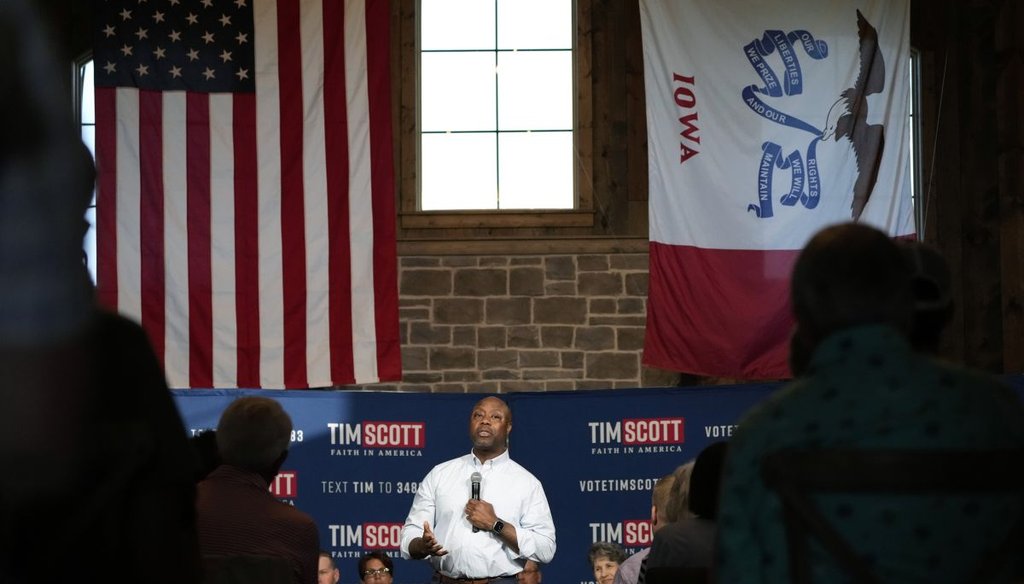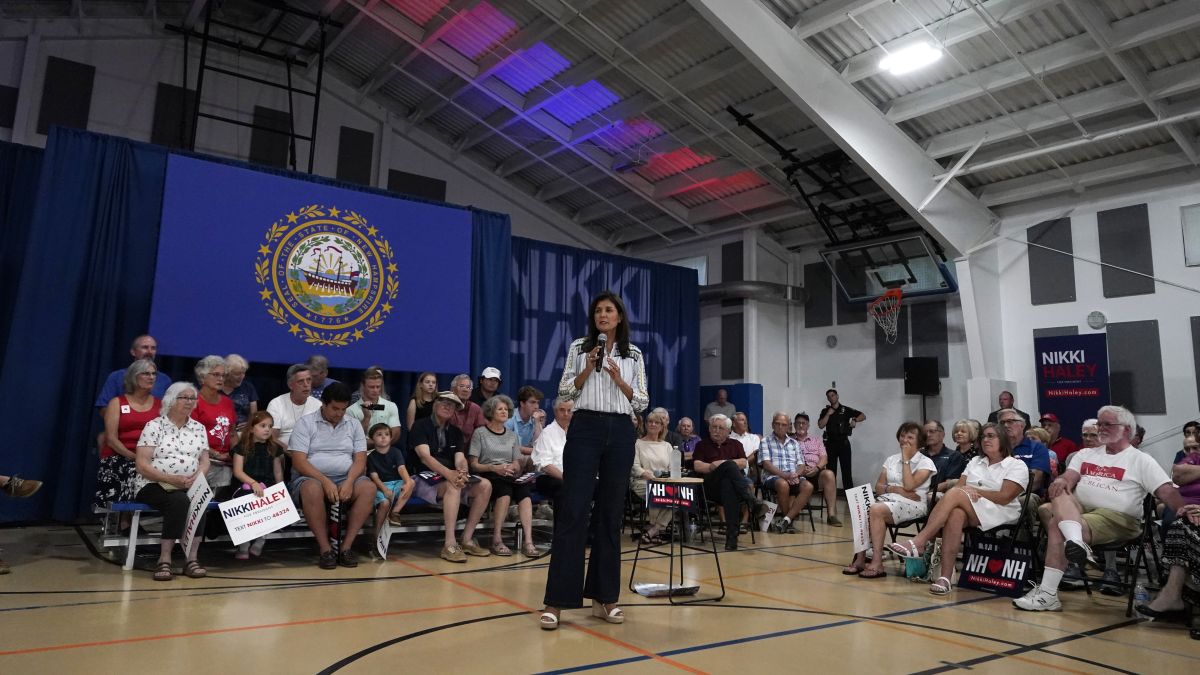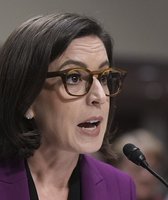Stand up for the facts!
Our only agenda is to publish the truth so you can be an informed participant in democracy.
We need your help.
I would like to contribute

Republican presidential candidate Tim Scott of South Carolina speaks during a town hall meeting in Pella, Iowa, on June 14, 2023. (AP)
It’s a little less than six months before the first presidential delegates are chosen — in Iowa, on Monday, Jan. 15.
So what happens after that?
A few slots remain to be penciled in for some key battlegrounds from previous primary seasons, including New Hampshire’s Democratic and Republican primaries, Iowa’s Democratic caucuses and Nevada’s Republican caucuses.
But the rest of the 2024 presidential primary calendar is pretty much set.
For Republicans, the quest for the nomination begins, as it has for decades, with the Iowa caucuses. The 2024 Democratic primary calendar, however, will run less in lockstep with the GOP calendar than it has in recent election cycles.
Sign up for PolitiFact texts
That’s because national Democrats made a concerted effort this year to overhaul the order of their early primary states.
Primaries and caucuses allocate delegates to each party’s national convention; those delegates formally approve the nominee. How these delegates are allocated depend in part on the results in each state, with Democrats typically apportioning delegates by a candidate’s share of the vote and Republicans using a mix of winner-take-all and proportional systems.
Barring something unforeseen, the Republican primary will be the more competitive of the two this year, as Biden is running as the Democratic incumbent and is not facing a top-tier challenger from the party’s mainstream. The other declared Democratic candidates are Robert F. Kennedy Jr. and Marianne Williamson.
The upshot of the 2024 primary calendar is that it will start a bit earlier and have enough jam-packed contests to heighten the pressure on contenders to achieve dominance.
"There will be a huge emphasis on those initial contests for a candidate to break through, or else the frontrunner wraps it up quickly," said Josh Putnam, a political scientist and consultant with FHQ Strategies who specializes in tracking the primary calendar. "We will have close to 80% of delegates selected by the end of March."
It’s worth noting the distinction between primaries and caucuses. In primaries, voters either go to the polls or cast ballots by mail, like they would in a regular election. In caucuses, voters gather at voting sites and group themselves in person with other supporters of their favored candidates, switching to another group if their candidate is eliminated from contention.
Primaries have been gaining favor in recent election cycles as they are less time-consuming for voters and thus open to wider participation.
Key Republican dates at a glance
Iowa’s Jan. 15 Republican caucuses will come about two weeks earlier than they did in 2020.
The caucuses will be followed about a week later by New Hampshire’s primary on Tuesday, Jan. 23. (That date is not finalized and could shift slightly.)
From there, the next GOP contest would be the South Carolina primary Saturday, Feb. 24.
After that is Michigan on Tuesday, Feb. 27.
Early Democratic dates at a glance
Following a flawed reporting of Iowa caucus results in 2020 — as well as growing concern among Democrats that Iowa is more heavily white than today’s Democratic party and thus unrepresentative of the party’s national electorate — the national Democratic Party decided to push several more demographically diverse states earlier in the 2024 calendar.
South Carolina will be the first state to allocate Democratic delegates in 2024. South Carolina had been fourth in recent cycles, including 2020, when Joe Biden rescued his candidacy with a primary win.
The state will hold its Democratic primary Saturday, Feb. 3 — three weeks before the state’s Republican primary.
After that, Democrats will quickly head to Nevada, on Tuesday, Feb. 6, followed by Michigan on Tuesday, Feb. 27.
When is Super Tuesday?
The most sprawling day of contests will come a week later: Super Tuesday, on March 5. Super Tuesday will include primaries for both parties in Alabama, Arkansas, California, Colorado, Maine, Massachusetts, Minnesota, North Carolina, Oklahoma, Tennessee, Texas, Utah, Vermont and Virginia.
If a candidate is to throw a knockout punch, Super Tuesday could end up being the day, given the sheer number of delegates at stake.
Republican presidential candidate Nikki Haley of South Carolina during a campaign stop in North Conway, N.H., on July 6, 2023. (AP)
Question marks remain in New Hampshire
For Democrats, the New Hampshire primary is the biggest unknown.
Prior to the reorganization approved earlier this year, the Democratic calendar had Iowa’s caucuses first, followed by New Hampshire. The Granite State’s first-in-the-nation status is reinforced by state law, and reconciling state law and national party preferences continues to be difficult for Democrats.
At this point, no primary date in New Hampshire has been set. By law, the state must hold the first primary in the nation, but the Democratic Party could deem that contest meaningless for delegate allocation and instead attempt, under threat of penalty, to push the state party to allocate delegates through a later party-run primary.
Republicans have shown no interest in challenging New Hampshire’s first-in-the-nation primary status.
The endgame in New Hampshire probably will have limited impact on the Democratic nomination fight, outside of the potential for a publicity coup for Kennedy or Williamson if they win a primary in January that is stripped of delegates. The bigger stakes could be how the result shapes the placement New Hampshire gets in the Democrats’ 2028 primary calendar.
What other dates are not yet settled?
Officially, the Democratic date for Iowa in 2024 remains unsettled, too. However, Iowa Democrats have taken a less confrontational stance against the national party, Putnam said, perhaps hoping that cordial relations with national Democrats in 2024 could result in a return to a relatively early slot for the state in 2028.
Nevada, with a large Latino population that is being courted by both parties, is solidifying its early spot in the calendar, switching in 2024 to a Democratic primary after holding caucuses in 2020. The Nevada GOP still plans to run caucuses in 2024, but the date is not yet set.
Democrats had also hoped to move Georgia — a hard-fought state in recent presidential and Senate battles — into the earliest grouping of states, but Republican officials in the GOP-led state dashed Democrats’ hopes earlier this year. Georgia will now vote a week after Super Tuesday.
RELATED: Fact-checking 2024 presidential candidates, who’s running
Our Sources
FHQ Strategies, 2024 presidential primary calendar, accessed July 17, 2023
Interview with Josh Putnam, consultant with FHQ Strategies, July 17, 2023



































